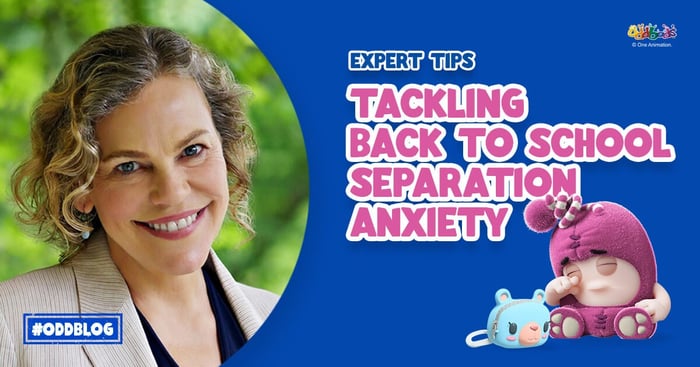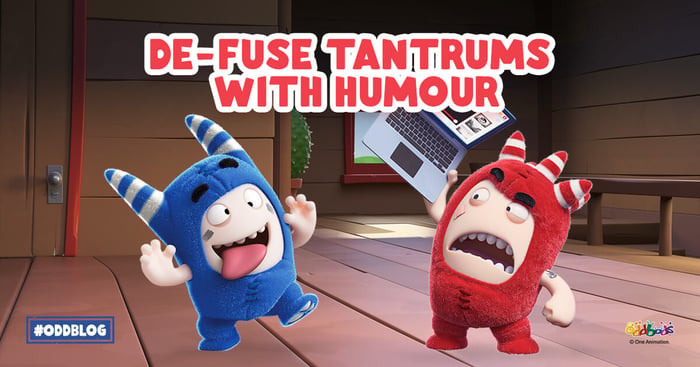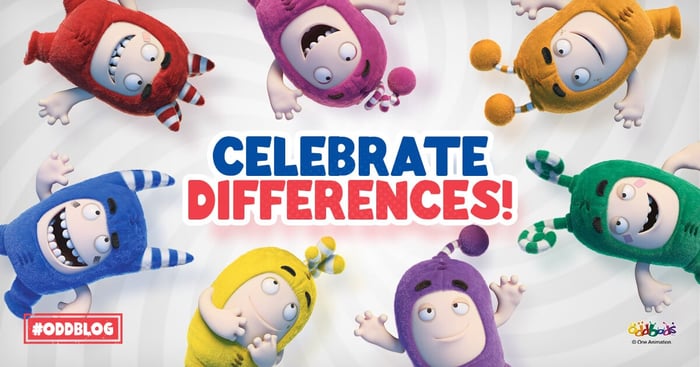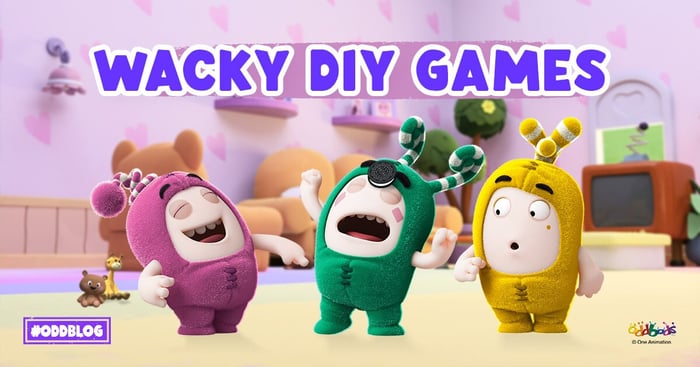Back to school is an exciting time of change, but it can create anxiety among kids (and some parents!). We chatted with parenting expert Dr Laura Markham to get some tips to help smooth the transition.
Oddbods: How can parents help make going back to school a happy experience?
Dr. Laura: Begin by talking and listening to your kids. Start the conversation by asking, “So, tell me three feelings you have about going back to school”.
Imagine your child says they’re scared about germs, for example. You could respond, “Ok, so you're scared about germs, tell me about that?”
After listening, you can explain, “Well, remember we talked a lot about germs during the pandemic? So it makes sense you'd be scared, but the school is cleaning everything and has this whole plan; they know what they're doing. You just wash your hands the way you've been taught, and you'll be fine. Don't worry, your body's got really good at fighting off germs, and we're going to make sure you eat healthy food and drink enough water and get enough sleep. And so you're going to be ok; I'm going to help take care of you.”
So you understand, you validate, you listen, you normalise, and then you reassure.

Oddbods: You mentioned it’s good to “normalise” kids’ feelings of anxiety. Can you explain more?
Dr. Laura: Parents should acknowledge how it’s normal and natural to feel a little scared. Explain how all the other kids are probably feeling worried about things too. On the first day of school, everybody worries a little bit, and then it's fine.
Remember, we're not trying to keep children from being uncomfortable. It's ok to feel a little nervous. That's how we all feel when we do something new. When you feel the fear, and yet you do it anyway, it's like you're building your courage muscles. It makes you stronger inside – so that's a good thing to do.
Our job as parents is to help our children know that they have the inner resources and the outer resources to cope.
Oddbods: What if a child doesn’t express their feelings openly, but they still appear anxious?
Dr. Laura: If your child says they’re not worried, then you could say, “Oh, wow! You're not worried at all? Most kids would be a little bit worried for their first day of school”. And then you need to just joke around about it because your kid’s being rigid.
Laughter helps them loosen up and start talking. It doesn't even have to be about school; it could be about anything. If they're little enough, put them on your back and be a bucking bronco before tossing them on the bed, just to get them laughing. Or if they're open to it, you can say, “Good, because I’m the school monster, and I'm coming for you!” You can get them laughing that you're the monster chasing them before sinking down together on the bed.
Then say, “Well, sweetie, that was so much fun! I wonder if maybe inside you're just a little bit worried. Well, if you are, you know you can always tell me about it.”
And then your kid will probably share that maybe they are a tiny bit worried because of how you connected.
Oddbods: What about dealing with separation anxiety?
Dr. Laura: Well, separation anxiety is when a child doesn't feel safe to be apart from their parents, because they rely on their parents to keep them safe. The antidote to fear or anxiety is not feeling worried about something bad happening to you.
Firstly, it’s most important for kids to be familiar and feel safe with their teacher and their school setting. But there's another way we can help them feel safe. Children, like all human beings, have stress hormones circulating in their bodies. And the best way to get rid of them, apart from a good night's sleep, is laughter. So, every day, a child needs laughter, and it can be about anything. Of course, you wouldn't do it at the moment they're expressing that fear. I’m not saying to laugh at their feelings of anxiety.
Try playing a separation game where you walk into a closet, and just before you shut the door you say to your child, “If you need me, shout abracadabra! And I'll jump out.” So you start moving toward the closet, but just before you shut the door and make your kid worried that you've disappeared, you pop out and yell, “Abracadabra!”. Then you explain that you said it because you missed them so much and you need them. You wrap your kid in your arms and roll them around. And they're laughing and laughing because you're so silly that you wouldn't even go in the closet. And in this playful way, your child is able to handle you going in the closet and shutting the door.
You're the one who's scared. Your child’s laughing at you and they don't feel embarrassed or worried. They're reassuring you!
So they're laughing about a separation from you, something that previously might have scared them. But now it doesn't, and they feel much better about it. The next time your child is in a situation where they have to separate from you, they won't have all those stress hormones telling them that there's danger. Instead, they'll be relaxed, because they laughed so much with you during the game.
Oddbods: Do parents sometimes get more anxious than kids about going back to school?
Dr. Laura: Great question! In fact, that often happens. So the first thing a parent should do before talking to their child is to check in with themselves. Because if you don't acknowledge your own anxiety, you’re likely to transmit it to your child.

Try writing down what you're anxious about. Then address each concern one at a time by coming up with a plan for dealing with it, and you'll feel better.
For example, you might be worried that your child will cling to you at drop-off on the first day of school. Well, you can make a plan - for example, you’ll say, “It’s going to be fine, you can do this. You can let go of me, and I'll be back to pick you up at three o'clock. Don't worry, you can handle it. If you need a grown-up, the teacher is there for you.”
It's also good if you can talk to somebody else about your concerns, preferably somebody who's calm about such things. They can help you come up with a plan so that you can be a little calmer before you talk to your child.
Oddbods: Great advice. Thank you, Dr. Laura! Here’s to smooth back-to-school experiences for all our Oddbods fans, young and old.
Dr. Laura Markham, the founder of parenting blog Aha! Parenting, trained as a clinical psychologist at Columbia University. She’s also a mom and author of three best-selling books, including Peaceful Parent, Happy Kids: How To Stop Yelling and Start Connecting.





